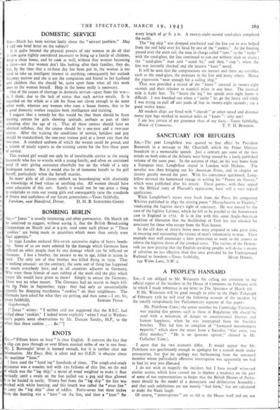SANCTUARY FOR REFUGEES
Sia,—The poet Longfellow was quoted to fine effect by President Roosevelt in a message to Mr. Churchill, which the Prime Minister broadcalt in a memorable speech. Just a century ago some of the best minds on both sides of the Atlantic were being roused by a lately published volume of the same poet. In the autumn of 1842, on his way home from a European tour, Longfellow stayed in London with Dickens. The novelist was then bringing out his American Notes, and its chapter on slavery greatly moved the poet. With his conscience quickened, Long- fellow devoted the homeward voyage to writing his " Poems on Slavery," which were published after his return. These poems, with their appeal to the Biblical story of Pharaoh's oppression, have still a very topical application.
While Longfellow's verses were fresh from the Press, his compatriot Whittier published in 1843 the stirring poem " Massachusetts to Virginia," vindicating the fugitive slave's right of sanctuary. He was moved by the case of the fugitive Latimer, which he felt to be parallel to the Sommersot case in England in 1772. It is in line with this same Anglo-American tradition of liberation that the Archbishop of York has just pleaded for sanctuary for those who escape from the Nazi horror.
In the old days of slavery brave men were prepared to take great risks in rescuing and succouring the victims of man's inhumanity to man. Their example may well encourage a later generation to work to the utmost to relieve the fugitive slaves of the crooked cross. The victims of the Herren- yolk are now praying that the English-speaking peoples will devise a means of salvation no less effective than that once provided by the Underground
Railroad to freedom.—Yours faithfully, HUGH HARRIS. 149 Wa/M Lane, N.W. 2.


























 Previous page
Previous page